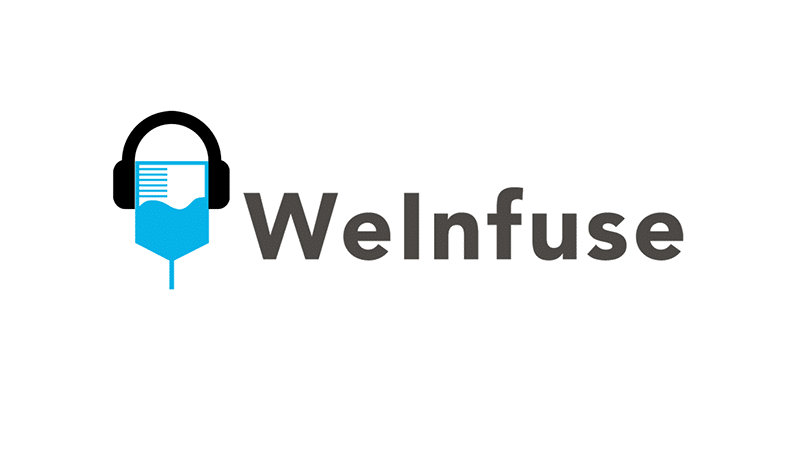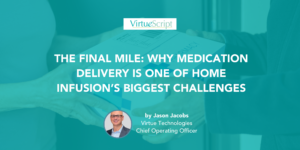Kaitey Morgan, nurse and board member of the National Infusion Center Association (NICA), shares her journey from nursing to helping create national infusion care standards. To learn more about NICA’s minimum standards of care, visit https://infusioncenter.org/.
Follow on Amazon Music II Subscribe on iTunes II Subscribe on Podbean
Transcript: How clinical skills and operations know-how paved the way for the national infusion standards
Dylan McCabe: WeInfuse Podcast, episode number 22. Welcome to the WeInfuse Podcast, my name is Dylan McCabe and in each episode we give you a behind the scenes look at the infusion landscape from multiple angles. We try to interview key thought leaders in the infusion space, whether it’s providers, operators, executives or clinicians. In this particular episode, I sit down with Kaitey Morgan who’s a board member of the National Infusion Center Association. She brings years of infusion nursing experience to the table and she was instrumental in building a thriving infusion management company from the ground up. So I think you’re really going to like this episode with Kaitey with that, let’s jump into it. Like I said, we have Kaitey Morgan with us today. Kaitey is a board member at the National Infusion Center Association. She was also instrumental in launching and starting an infusion management company. She brings years of nursing experience, so she is a nurse. She brings a lot of that to the table today. We definitely want to tap into her clinical knowledge. We’re excited to have her on our podcast and with that; I’ll just kind of open up to her question. Kaitey, would you just mind laying out your background for us, how did you get from a high school education to becoming a nurse and then ultimately getting into infusion?
Kaitey Morgan: Well, thanks for having me. I’m really happy to be here. I have been a nurse for 11 years. I’ve always wanted to be a nurse. My mom recently retired, but she was an infusion nurse for most of her career. She started an infusion center, a hospital outpatient department and grew that from one chair to I think it was twelve or so when she retired. So we always saw the relationship she had with her patients and the impact she had. We lived in a small town, so we’d run into people in the grocery store and they’d say, oh, I love your mom, she’s an angel. So I’ve always wanted to be a nurse, after I went into nursing school, my first real job was inpatient oncology. So there was a heavy infusion portion to that. But that was 12 hour overnight shifts, which you can only do for so long or I could only do. So I went to outpatient infusion after about four years and that’s where I’ve been ever since.
Dylan McCabe: So from the hospital to outpatient infusion; from the hospital was that when you started or helped start this infusion management company?
Kaitey Morgan: It wasn’t. I went from the hospital inpatient position to a hospital outpatient infusion role. I was there for, oh gosh, I don’t even remember how many years now, maybe four and my husband’s job transferred us. We moved from Maine to New Hampshire. So there, I kind of right place, right time fell into this position to help start an infusion management company.
Dylan McCabe: So for our audience, we say Infusion Management Company, we also say MSO or managed service organization. So you may hear that lingo if you’re out and about and conversing in the infusion space. Well, one of the things, I don’t think we’ve had the opportunity to interview someone who has a CRNI certification. Tell us about that certification. How did you get it? How rigorous of an exam was it? I’ve heard it’s hard.
Kaitey Morgan: It is hard, yeah. I want to say the last time I looked; the passing rate was like maybe 65%. I’ll have to fact check that afterwards, I’m not sure, but to qualify to sit for the exam you have to have, I believe it’s a thousand hours of relevant clinical experience in the past year. So you can’t be a brand new nurse and try to say you’re certified.
Dylan McCabe: The certification is an infusion certification for registered nurses, correct?
Kaitey Morgan: Correct, so CRNI is Certified Registered Nurse Infusion, which is kind of an [Inaudible] but CRNI, yeah. So you’re a registered nurse and you have specialized knowledge in infusion. So the test covers everything from vascular access to IV fluids, equipment, pumps and filters. I mean, it is a hard test, when I took it they didn’t quite have the library of training materials that they have now. So it was more like sit down and memorize the book and then you recertify every three years.
Dylan McCabe: Was the book the infusion nurses society book, is that correct?
Kaitey Morgan: Yeah, there are the two books, really their standards and their policies and procedures. Now they have study guides and what do they call it? CRNI Academy and some really, really cool resources, I didn’t have those. Then every three years you have to recertify by either retaking the test or by obtaining so many recertification units throughout the three years.
Dylan McCabe: I did not know that.
Kaitey Morgan: Yeah and they’re specific to infusion.
Dylan McCabe: Awesome.
Kaitey Morgan: So yeah, by becoming a CRNI and maintaining that really make sure you have that level of knowledge.
Dylan McCabe: Awesome. That’s awesome. So we’ve hosted a few other guests that have started infusion centers and I believe we’ve even hosted a guest who was instrumental in starting in the fusion management company as well. But what challenges did you incur out of the gate? I mean, like starting a business, I mean, I can speak first hand, super challenging starting a business in healthcare. Software’s challenging in healthcare direct patient care is even more challenging especially in this kind of nebulous infusion center space. So who did you lean on? What organizations and just tell us about that experience?
Kaitey Morgan: I think the hardest part, like you said, right out of the gate was that this still is a new space, but especially a few years ago it was more new. So there were not resources when; the way my sort of brain works is okay, if we’re going to do something what are the rules, how do we do it right? And those resources didn’t exist. We had to sort of cobble them together from different existing resources. So infusion nursing society, the immunoglobulin nursing society, ONS, alphabet soup of organizations that put out rules about each little specific thing and there was nothing, it wasn’t nicely compiled like it is today. So I actually met Brian Nyquist because I was Googling, trying to solve a problem. I’d run into this roadblock, a regulatory issue with preparing parenteral medications and getting some pushback from regulators and I thought, well, I can’t be the first person to run into this problem. People are all infusing all over the country; someone must have the answer in a nice little package for me.
Dylan McCabe: And let me just see if I can articulate the problem. The issue was in a particular state, the state board of pharmacy said, hey, if you’re mixing drugs in a clinic environment or a quote unquote physician office environment, you should have a pharmacist on staff doing that in a cleaner room, et cetera, is that correct?
Kaitey Morgan: Correct, so they felt that any manipulation of an IV product was compounding which then made it subject to all these regulations really restrictive, really expensive, and really unnecessary for the environment. We’re not talking about a hospital clean room or a specialty pharmacy that’s shipping these out. We’re talking about immediate administration to a single patient sitting in front of you. We’re not batching, we’re not storing, so there was just no category. So we had nothing to point to and say, no, look, this is what we’re doing and this is why it’s okay. So I came across the National Infusion Center Association, contacted Brian Nyquist and said, hey, have you ever gotten this question before because I’m having a little trouble here and he actually flew out and attended the legislative hearings and provided testimony and was really, really helpful in helping us fight that battle and ultimately making it so we could continue to progress and open and start seeing patients and get them the infusions that they need.
Dylan McCabe: Awesome. Well, and so to bring this full circle, so Katie intersects with Brian Nyquist during this state issue, this regulatory issue. Now, again, she’s a board member of the National Infusion Center Association, and you said you cobbled together all these resources from INS and IGNS and other organizations to ultimately you were instrumental in drafting the national infusion center associations, minimum standards, which I think now, so many of our clients that WeInfuse and just infusion centers in general, lean on to make sure that they’re doing things properly. So maybe can you speak into that, like where all these experiences, the culmination of where they brought together to produce this?
Kaitey Morgan: Yeah, it’s been really I don’t know, sort of, I don’t know if it’s fateful or serendipitous or what it is, but having had the path that I have to get here and then to be able to develop those standards with the help of the advisory committee and all these experts in thought leadership space, it was really cool, really exciting, really great people and now I get to, when I talk to I was speaking with a nurse at a conference not too long ago and she’s sets the challenge discuss the challenge that I just said, which is, I don’t know where to turn to and she hadn’t heard of the minimum standards, it was right after they came out. So I got to say, hey, and I emailed her right then and there a link to them and she said, oh, this is just what I’ve been looking for, which I wish I had had at the time, but now to me, it’s just as exciting.
Dylan McCabe: Well, you played a key part in writing them, which is really cool and I just completely skipped over the question I asked before, which was kind of the main challenge obviously; had a huge regulatory hurdle you ever came. What other challenges just in developing clinical protocol to recruiting nurses, retaining nurses, what were some of the challenges getting started?
Kaitey Morgan: Ah, yes, recruiting and retaining nurses is tough. I think nurse training and being able to develop a training program that start to finish, you feel like when you’re leaving that nurse, that you have an infusion expert taking care of patients because anyone who knows one or two or three nurses knows a nurses and the nurses and the nurse, there’s a million different flavors. That’s why I love nursing because if you get bored there is always something else you can do. So just having someone who has RN after their name, doesn’t mean your job is done, there’s more to it then that. So that has been really challenging part of our model was geographically remote sites from where I was so being able to not physically be there, but have to virtually be there providing support making sure that nurses working independently don’t feel like they are alone was a challenge, I think we did that really well though.
Dylan McCabe: That’s awesome. Well kind of a shameless plug for WeInfuse, Kaitey was one of the first WeInfuse clients, your organization was and still is and we’re very thankful to have that organization as a client. Tell us how did you find WeInfuse? You found us when we were early; we probably over promised and under delivered to death. I hope we under promise and over delivered. So tell us about using a brand new software in a brand new space with a brand new company.
Kaitey Morgan: Sure. So finding an EMR was really important if you’ve worked in healthcare, you’ve used more than one EMR nothing against them, but none of them, I’ve never said, I love my EMR which I did say using WeInfuse. I found WeInfuse, shameless plug for Google I guess infusion software and found that WeInfused website and a little box popped up that said, oh, do you want to learn more? I typed in I think my email and phone number and maybe 10 minutes later my phone was ringing and it was Judy Beck.
Dylan McCabe: Love Judy Beck.
Kaitey Morgan: I won’t do her Southern accent, but I mean, pretty much right away, we kind of went into a demo. It wasn’t so much schedule it later. I wanted to know now and she had the time and walked me through and I said, this is amazing. This is exactly what we need. I’ve always, I had used hospital EMRs that we were trying to sort of gear towards this specialty that really needs its own focus and so finally seeing it, I was like, oh, this is amazing. Someone actually did it
Dylan McCabe: Well. And again, thank you for your patience, Katie, just as you’ve been able to walk with us along as we develop and better develop the application. I know there are so many little requests you’ve had that we’ve been able to…
Kaitey Morgan: I think I drove your support team crazy with my WeInfuse wish list at the beginning, but that’s what was so great about it, to be able to say, hey, I wish my EMR did this and WeInfuse would say, okay, we can do that and make it happen really fast. It wasn’t, we’ll put it on the list.
Dylan McCabe: Sometimes it would take months, but still true, instead of years.
Kaitey Morgan: Instead, we’ll put it on the 24 months list. I had that response from previous software. So yeah, the responsiveness has been, it’s a huge advantage aside from just how well thought out the software is and how intuitive it is.
Dylan McCabe: Well, thank you. Again, if you need to learn more information about WeInfuse visit our website, weinfuse.com request a demo either myself or one of our sales team members will get a hold of you and get right back to you to schedule that demo. Just some parting wisdom for anyone wanting to enter this space, whether that’s clinically, but you also bring your business acumen to the table as well now, what piece or pieces of advice would you give those individuals that want to enter the space?
Kaitey Morgan: I think in conversations I’ve had with folks who think they want to start maybe a physician office who thinks they want to start off for with infusions, if you are considering that and are pretty sure that it’s not going to be that hard and you can do it, then my advice is do a lot more research and it’s not worth doing if you’re not going to do it right, whether financially, clinically it’s just not worth it. So do your homework, there are organizations out there who their specialty is managing infusion operations, their specialty software, their consulting services, sort of an in between but you can’t go it alone, you just can’t.
Dylan McCabe: Yeah, and these drugs are so expensive, mistakes can be so catastrophic. So just want to make sure you dot your I’s and cross your T’s. Well, Kaitey, thank you so much for your time today. We’re excited to have you on, still love working with you at WeInfuse as a client, but also on the board of the National Infusion Center Association where Brian Johnson and I still serve. So thank you so much for all you do for our industry and we’re so glad you came on today.
Kaitey Morgan: Thank you so much. It’s been a pleasure.
Dylan McCabe: Thank you.
Guest Speaker:
As Chief Clinical Officer for the National Infusion Center Association (NICA), Kaitey Morgan, RN, BSN, CRNI, directs the standards for in-office infusion. Prior to her position as Chief Clinical Officer, Kaitey served as a Board Member for NICA, a nonprofit association dedicated to representing non-hospital, community-based infusion providers. With over 15 years of clinical experience, she works to develop educational resources and training material for infusion patients and providers.




